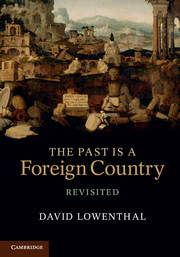A Tribute to David Lowenthal (1923 – 2018)
CHRC Graduate Member, Andrea Kocsis provides a personal reflection on the meaning of David Lowenthal’s work to her.
Devastated to hear of Professor David Lowenthal's death last week I reread his main works, The Past is a Foreign Country, and, The Heritage Crusade and the Spoils of History. At this moment, each of his arguments seemed somehow evident. Not because they were obvious statements, but because we have learnt each line by heart by now, and in many ways, they have formed the foundations of our everyday work as Heritage researchers.

I first discovered Lowenthal's books as a naive history student, knowing nothing about heritage and having unclear ideas about both past and future. During our lectures we pulled apart each sentences of The Heritage Crusade, and looked beyond its irony, humour and poesies to highlight those key statements which later became the axioms of Heritage Studies.
David Lowenthal taught us that heritage is not about the past, but about the present. That in heritage the past is a constructed fiction, an empty slogan. What heritage really does is give form, control, and legitimacy to the present. He showed us that “all at once heritage is everywhere”, invading our everyday life both consciously and unconsciously. However, he was also one of the first to point out that heritage is never stable, but constantly in flux. He described for us the ease with which, through heritage, the past can be distorted and shone a light on its many uses and abuses.
His works made clear to me the difference between heritage and history, and how we are on a wrong path if trying to look at heritage with the historian's methods. As he wrote in the Heritage Crusade, “the spoils of history lie all around us—in developers' debris, in the sacked remains of prehistoric tombs, in the ravaged ruins of Mostar and Sarajevo, in the fetishes of restorers and reenactors, in the paraphernalia of cultural tourism. They proliferate too in patriotic credos and self-serving anachronisms, in the certitudes of school history, in the delusory dreams of Disney, in the squabbles of rival claimants to relics and emblems. Such feuds make heritage a menacing minefield as well as a nourishing marvel. We need to understand what impulses drive us, heritage crusaders all, to ravage the past in the very act of revering it and to censure others for faults equally our own”. Our research field was born and we investigate the link between past and present for these reasons he gave.
Lowenthal's theory is inevitable not only for the narrow Heritage field. It helps to understand our contemporary present. He warned us to recognise fake news, even before he could see their proliferation in social media. He reminded us how elementary the fake news was in spreading xenophobia and chauvinism and how populist politics uses heritage for legitimising power. “Heritage actuates a mountain of false information that sustains all societies”, he said.
David Lowenthal taught us that the basis of nationalism is so often a twisted heritage; one which can be used for negative as well as positive purposes. He warned us about this ambivalent nature of heritage: the ease with which it can integrate a society, and the ways it can fuel exclusion too. Lowenthal also observed that the worse the present situation seems, the more desperately we want to revive the past: “As hope of progress fade, heritage consoles us with tradition”. Rereading the Heritage Crusades today his observations seem as relevant as ever.
Professor David Lowenthal died peacefully at home in London on 15 September 2018. His critical eye, through which he looked at our present, will be painfully missed. Although, we think of him as the father of Heritage Studies, he is not our reluctant heritage, he is more than that: David Lowenthal is our history.
We remember fondly the talk he gave to our Research Group in 2012 on his own personal reflections on the state of heritage in and hope you enjoy reliving it with us.
